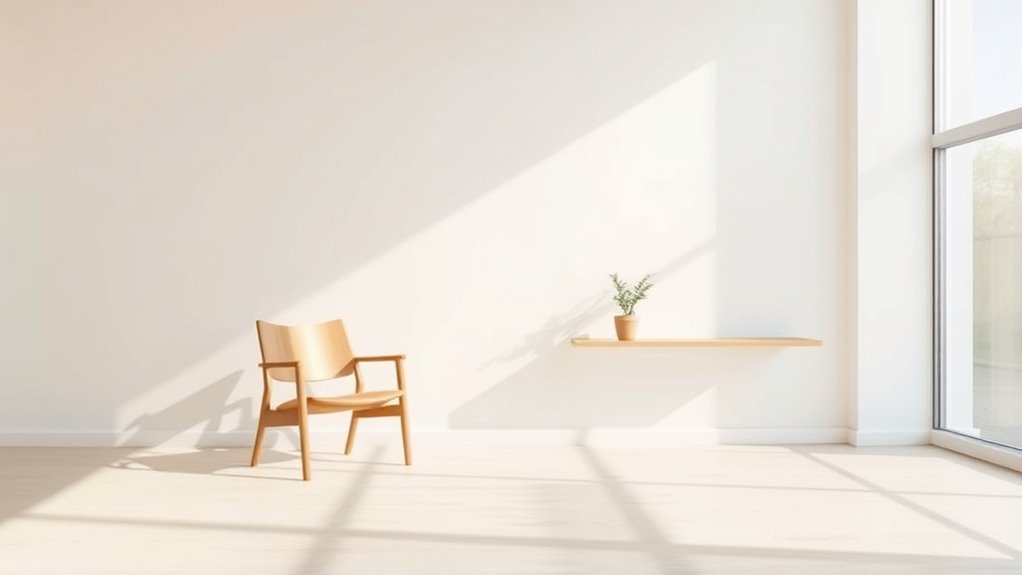Owning less through minimalism can markedly boost your mental health by reducing clutter, which often overwhelms your environment and creates visual chaos. Simplifying your surroundings helps you focus better and feel calmer, giving you a greater sense of control. Fewer possessions mean fewer decisions, lowering decision fatigue and conserving mental energy. As you embrace minimalism, you’ll cultivate contentment, emotional stability, and clarity—secrets that can transform your well-being as you learn more about the science behind owning less.
Key Takeaways
- Reducing clutter minimizes visual chaos, promoting mental clarity and reducing feelings of overwhelm.
- Owning fewer possessions decreases decision fatigue, conserving mental energy for more important choices.
- Organized environments foster a sense of control, stability, and emotional well-being.
- Minimalism shifts focus from materialism to meaningful experiences, decreasing comparison and mental clutter.
- Long-term minimalist practices support mental resilience, emotional balance, and overall psychological health.

Adopting a minimalist lifestyle can considerably improve your mental well-being by reducing clutter and eliminating unnecessary distractions. One of the main ways it does this is by tackling space clutter, which can overwhelm your environment and, in turn, your mind. When your space is filled with things you no longer need or use, it becomes difficult to focus and relax. Clutter creates visual chaos that constantly demands your attention, making it harder to find peace or concentrate on what truly matters. By simplifying your surroundings, you create a calming environment that promotes clarity and serenity. Additionally, minimalism encourages you to be more intentional with your belongings, fostering mindfulness about what truly adds value to your life. Beyond the physical clutter, minimalism also helps combat decision fatigue. Every item you own represents a decision—whether to keep, use, or store it. When your possessions are abundant, you face a seemingly endless stream of choices throughout the day, which can drain your mental energy. Decision fatigue wears down your ability to make good decisions, leading to stress, impulsiveness, and decreased productivity. Simplifying your possessions means fewer choices, freeing up mental resources for more important decisions. It’s easier to focus on your priorities when you’re not bogged down by the mental load of managing unnecessary belongings. Reducing space clutter creates a more organized environment, which directly impacts your mental health. When everything has a designated place and there’s less chaos, your mind automatically feels less overwhelmed. This orderliness fosters a sense of control and stability, helping you feel more grounded. As you declutter, you also gain a clearer perspective on what truly matters to you. This process often leads to a greater appreciation for quality over quantity, encouraging you to invest in meaningful possessions rather than accumulating things for the sake of it. Furthermore, minimalism encourages intentional living, which can profoundly lessen the mental strain caused by constant consumerism. When you focus on owning less, you’re less likely to fall into the trap of impulse buying or comparing yourself to others based on possessions. This shift reduces the mental clutter associated with materialism, helping you develop a healthier relationship with your belongings and yourself. Over time, embracing minimalism can cultivate a sense of contentment and peace, reinforcing your mental resilience. By creating a clutter-free environment, you also support a sense of emotional balance, which is essential for overall mental health. In essence, by decluttering your space and simplifying your possessions, you minimize both physical and mental chaos. This approach not only makes your environment more peaceful but also preserves your mental energy, allowing you to focus on what truly enriches your life. Minimalism isn’t just about owning less; it’s about creating space for mental clarity, emotional balance, and genuine happiness.
Frequently Asked Questions
Does Minimalism Improve Long-Term Mental Health?
Yes, minimalism can improve your long-term mental health by promoting space saving and clutter reduction. When you own fewer possessions, you create a calmer environment that reduces stress and anxiety. This simplicity helps you focus on what truly matters, fostering a sense of control and clarity. Over time, embracing minimalism can lead to sustained mental well-being, making it easier to manage daily challenges and maintain a healthier, more balanced mind.
How Does Minimalism Affect Stress Levels Over Time?
Minimalism can lower your stress levels over time by reducing clutter and creating a more organized space. As you practice mindfulness, you become more aware of what truly matters, which helps you let go of unnecessary possessions. This combination of clutter reduction and mindfulness promotes calmness, decreases anxiety, and fosters a peaceful environment. Over time, these habits support your mental well-being, making daily life feel more manageable and less overwhelming.
Can Minimalism Help With Anxiety or Depression?
Yes, minimalism can help with anxiety and depression by reducing clutter, which often triggers attachment anxiety and feelings of being overwhelmed. When you own less, you create a calmer environment that promotes clarity and peace. Letting go of unnecessary possessions eases your mind, decreases stress, and helps you focus on what truly matters. This simple lifestyle shift can foster emotional stability and improve your overall mental health.
What Are Common Challenges When Adopting Minimalism?
It’s like stepping into the 21st century with a flintlock, because adopting minimalism can be challenging. You might struggle with letting go of material possessions or feel anxious about losing social relationships tied to your clutter. Setting boundaries, rethinking your priorities, and understanding that less can be more help you overcome these hurdles. Remember, patience and persistence are key as you create a simpler, more intentional life.
Is Minimalism Suitable for Everyone Regardless of Lifestyle?
Minimalism isn’t suitable for everyone, especially when considering cultural differences and financial implications. Your lifestyle, values, and community influence how effective minimalism can be. If you value possessions or community connections that revolve around material items, minimalism might feel restrictive. Also, consider your financial situation; downsizing or decluttering could have costs or savings. Ultimately, adapt minimalism to fit your unique circumstances rather than following a strict, one-size-fits-all approach.
Conclusion
By embracing minimalism, you free yourself from clutter and stress, making space for what truly matters. You might think owning less means sacrificing comfort, but instead, it creates a calm environment that nurtures your mental well-being. Imagine walking into a tidy, peaceful room after a hectic day—it’s a simple shift that can transform your mindset. So, don’t let the idea of losing possessions hold you back; minimalism can bring clarity and peace to your life.









